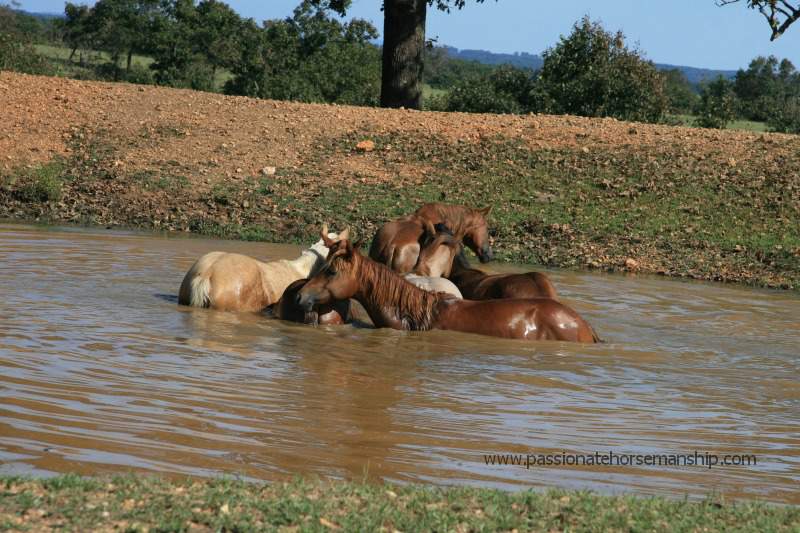
During the summer you’ll want to make sure you check your horse for signs of heat stress.
A horses body temperature is higher than ours, therefore, they get hotter faster than we do and are more susceptible to the effects of heat stress.
It’s not just the temperature you have to think about it’s the heat index too. When a horse sweats it evaporates and carries heat away from the body which cools them down.
When the heat index is high it’s harder for horses to cool themselves because high humidity reduces the evaporation rate. When this happens the heat is removed at a lower rate causing them to retain more heat than if the air were dry.
Do you know what’s normal for your horse’s pulse, respiration and body temperature? If not, now would be a good time to check their vital signs and keep a record.
Here are several things you can do to help your horse during the summer heat.
Probiotic
Give your horse a good probiotic to help with digestion. The gut is one of the first things that suffer in horses who stand out in the sun. A good probiotic supports the healthy bacteria in your horse’s gut and keeps their digestive system working. I give DynaPro to all of my horses it’s a great product.
Salt
Salt is imperative for horses. I don’t use salt blocks because their base is a bleached salt and they contain glues and binders which is not good for your horse. I only use loose salt from Dynamite Specialty Products.
The blocks were designed for cows who have rough tongues. A salt-hungry horse will try to chew off chunks which then frequently results in TMJ problems and this can lead to a lot of other problems.
Electrolyte’s
Most people want to add salt to their horses feed, but that’s not a good idea at all. If you add regular salt to your horse’s feed that’s an unbalanced profile and it can throw off their electrolyte balance.
Instead, give them a good electrolyte that does not contain artificial flavors or colors. I give my horse’s DynaSpark which can be put in their feed or water. Always start off with a small amount and work your way up to the recommended dosage on the label.
Check For Dehydration
This can happen quickly. To see if your horse is dehydrated do the pinch pull skin test on your horse’s neck or shoulder if the skin flattens back into place when you let go in one to two seconds the horse is fine.
If it doesn’t, then it means the horse is not drinking enough water and is possibly dehydrated. Make sure your horse has access to fresh clean water at all times. Horses require a minimum of 8 to 12 gallons of water per day.
Check their gum color it should be bubblegum pink and the gums should be moist. If they are any other color and feeling dry they are probably dehydrated.
I also check the capillary refill time. Gently apply pressure on the gum just above the teeth. When you remove your finger the spot will be white if the spot does not return to the pink color within a few seconds your horse is probably dehydrated.
Shade
If you don’t have trees available for shade then have a run-in shed with good ventilation. If you keep your horse in a stall make sure there is plenty of air circulation. If the air circulation is not good use some fans to get some circulation going.
Cooling Off
Did you know that it only takes 17 minutes of moderate exercise in hot, humid weather to raise a horse’s temperature to dangerous levels? To cool your horse off pour water over them and then scrape it off, pour on more, and just keep repeating this process until they’re cooled down.
Make sure you scrape the water as this is very important to cool them down. If you don’t scrape the water off it will get trapped in the horse’s hair and quickly warm up. (Resource:https://www.farnam.com/stable-talk/dont-let-summer-heat-get-the-best-of-your-horse)
Heat stroke can happen to horses that stand in stuffy barns or from traveling in trailers? Call your veterinarian immediately if your horse has any of these signs:
- Labored or faster breathing in an inactive horse
- Elevated pulse that does not drop a few minutes after being worked
- Profuse or no sweating at all
- Elevated body temperature
- Dehydration
